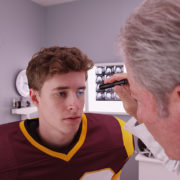Five Signs of a Traumatic Brain Injury
Symptoms of a Mild Traumatic Brain Injury (MTBI) or concussion can take a few days to a few weeks to be noticed, especially if you are addressing other physical issues. At the time of the injury you “walked it off” but later continued to have some lingering symptoms. Here are some common symptoms to be mindful of after an injury:




